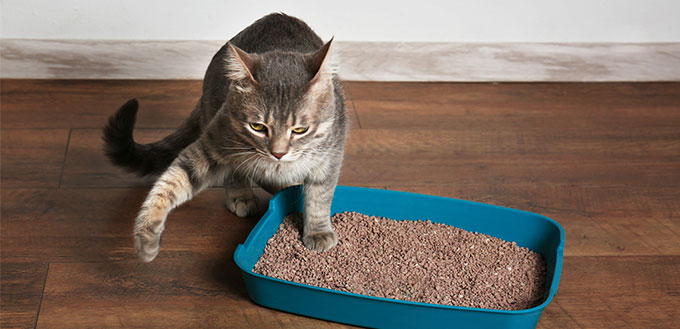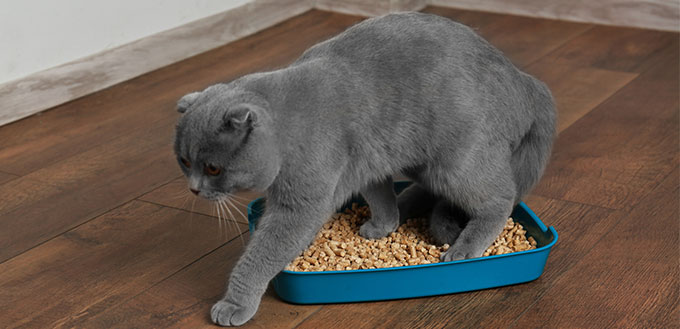“How often should my cat ‘go’?” “How many times a day is it normal for a kitten to poop?” While not glamorous, these are valid questions that every single cat owner has asked themselves at one point or another. According to Cornell University College of Veterinary Medicine, healthy cats poop one to three times a day. However, the exact frequency with which cats and kittens will move their bowels depends on various factors, including their diet, age and lifestyle, underlying health problems, how stressed/relaxed they feel, and so on. In short, it depends. But that doesn’t really tell you much about the right number of times your pet should ‘go’ a day, does it? Probably not, but hopefully, this comprehensive article on healthy cat bowel movement will.
Cat Poop: What is Normal?
Before we talk about the specific factors that may make your kitty go to the toilet less or more often, it’s important we cover the basics. The general rule of thumb is that a cat should pass a bowel movement at least once a day. Equally important, that stool should be of specific shape and color: ideally, perfectly formed, not too hard and not too soft, with normal brown color. Another important thing to ask yourself is how hard or easy it is for your cat to actually go to defecate. Your kitty shouldn’t strain or meow while pooping, as they should be able to pass the stool without any discomfort or pain.
So, to sum up, a healthy cat should:
- Poop at least once a day
- Pass a bowel movement normally, without straining
- Their stool will be well-formed, brown in color
- It will also be not too hard or too soft and normal in smell.

When Should You Worry?
While there is no hard rule on how many times a day a cat should go, one to three times a day is considered normal. If your kitty goes within the normal range number, but you still suspect something is wrong, a good question to ask yourself is how much your pet’s current bowel movements differ from their normal bowel movements.
For example, if your cat normally poops once a day and their stool is firm and normal in color and smell, and then starts pooping three times a day, with stools being soft and mushy, something may well be wrong. In this case, it’s highly likely your kitty is suffering from diarrhea. On the other hand, if your pet starts pooping every other day and their stool becomes hard and small, it’s more than likely they suffer from constipation.
Diarrhea
A cat with diarrhea struggles with abnormally frequent passage of stools that are watery or very soft, often strangely colored (yellow or even grayish) and foul-smelling. Although diarrhea is usually a short-lived condition, it can still be a serious one, especially if the cat in question goes to the toilet too many times a day (some cats go over four!) but doesn’t eat or drink water. Usually, diarrhea is caused by a change in diet, although it can be associated with the gastrointestinal tract and a result of inflammatory, infectious or neoplastic disorder. In any case, if the condition persists for more than two days, it’s crucial to talk to a vet.
Common causes of cat diarrhea include:
- A change in their normal diet /food sensitivities or allergies to the new diet
- Inflammatory bowel disease
- Viral or bacterial infections
- Intestinal parasites
- Colitis
- Metabolic diseases such as pancreas disease or thyroid imbalance
- Medications or toxins
Thankfully, most cases of diarrhea in cats can be dealt with a simple change in diet. The best cat food for constipation is food that is higher in fiber than usual, or alternatively, much blander than usual. To help your cat deal with this condition as efficiently as possible, it’s vital to feed them a dry diet that doesn’t irritate their stomach. In practice, this means avoiding foods that you know your cat reacts poorly to (i.e. some cats are sensitive to grains, others to chicken…) and sticking to those they normally like and do well on. It may also be a good idea to give fiber and probiotic cat supplements.
While most cases of diarrhea are harmless, lasting for a day or two, some cases are a symptom of a more serious health problem. For instance, if the condition is recurrent, it’s likely it’s associated with another health issue, such as hyperactive thyroid gland, a neurological abnormality, immune system abnormality, kidney or liver disease or any kind of viral infection. Finally, it could also be a symptom of lymphoma, which is a tumor of the lymph nodes. So, if your kitty suffers from diarrhea for more one to two days, or if the condition keeps returning from time to time, it’s imperative to talk to your vet to rule out any serious health problems.
Constipation
Constipation is defined as the inability to routinely and easily empty the bowels. So, if your cat struggles with either inability to poop regularly (remember, at least once a day), or painful straining while trying to produce anything for the litter box, it’s more than likely they suffer from constipation. Now, constipation is rather natural for most cats – from time to time. The problem arises if the condition lasts for too long or occurs too frequently.
But what is too long or too often when it comes to constipation? Experts agree that healthy cats go to toilet one to three times a day, depending on the cat’s age (kittens go more often, older cats fewer times a day), as well as diet, so if your pet doesn’t seem to visit their litter box for more than one day, you’re dealing with constipation. That being said, even if your kitty manages to produce stool once a day, but that stool seems to be very dry and small, plus the animal strains and cries while in the litter box, it’s still constipation you’re dealing with.
Related Post: Best Cat Food for Constipation
Common causes of cat constipation include:
- A change in their normal diet
- Diet too low in fiber and probiotics
- Dehydration
- Traumatic injury
- Infection
- Underlying metabolic abnormality
- Intestinal tumors
- Adverse reaction to medications
Usually, cats will struggle with constipation because of simple reasons, such as a change in their normal diet (like suddenly switching to high-protein, or grain-free or low-fat food; basically anything that’s is out of the ordinary for your cat). Often, a lack of access to drinking water is to blame too. Unfortunately, most kitties are highly picky and finicky eaters and drinkers, so even if their water bowl is right in front of them all day long, unless it’s fresh and cold, they may not drink it.
You May Also Like: Cat Water Fountain
So how should you deal with this condition? Generally, it’s a good idea to introduce high-fiber foods to your cat’s diet, at least from time to time, as well as wet food formulas as much as possible. This is a great way to prevent constipation in the first place, but can also help if your pet seems to struggle with frequent bouts of constipation. That being said, if the condition lasts for longer than two days or occurs very frequently, you should talk with your vet to rule out other, more serious health problems. You should be especially concerned if your cat is crying out in pain while trying to defecate, or if you see blood in their stool.

Bottom Line
Cats are sensitive creatures and various little things can affect their behavior, as well as their health. Most will defecate at least once a day, although many healthy felines go two to three times a day. Whether your kitty visits their litter box once or three times a day, it’s important they produce firm stools that are normal in color and smell. It’s also important they’re able to defecate easily; any straining is a sign something’s not right with their gastrointestinal or digestive health.
That being said, all cats are different. Some of the things that can affect your pet’s bowel movements are:
- Their age: kittens poop several times a day while seniors typically go just once a day. Adult, healthy cats tend to defecate one, two or sometimes three times a day.
- Their diet: while some felines don’t have any issues eating super-high protein and low-fiber foods, many cats actually do. Fiber is important for cat’s digestive health, especially for indoor cats that don’ have access to plants and grasses they would normally eat outside.
- Their activity level: physically active cats will have better health in general, including gastrointestinal and digestive health. Sedentary pets, on the other hand, will typically have poorer health and won’t have a bowel movement as often and as easy as active cats.
- Their stress level: like humans, felines can get stressed from various things, including their environment and people and animals that surround them. Some cats don’t get along nicely with other pets (especially if they were your only pet and suddenly have to deal with one or multiple other animals) and may feel stressed/nervous/afraid if forced to spend most of their time around other cats and dogs. Other cats may feel lonely, some will be nervous because of frequent guests, or because you moved, changed their routine and so on. Whatever the cause (and clearly, there can be many), if your kitty is feeling stressed out, they may not be able to defecate normally.
The best way to prevent cat GI tract and digestion issues and help your pet ‘go’ regularly and easily, is to feed them quality, healthy diet and ensure they always have access to fresh, clean water. It’s also important to make sure they’re physically active and have plenty of playtime – every single day.
Sources:
- The Scoop on Cat Poop, WebMD
- Krista Williams, BSc, DVM, Diarrhea in Cats, VCA Hospitals
- Preventing Litter Box Problems, The Humane Society
Note: The advice provided in this post is intended for informational purposes and does not constitute medical advice regarding pets. For an accurate diagnosis of your pet's condition, please make an appointment with your vet.






